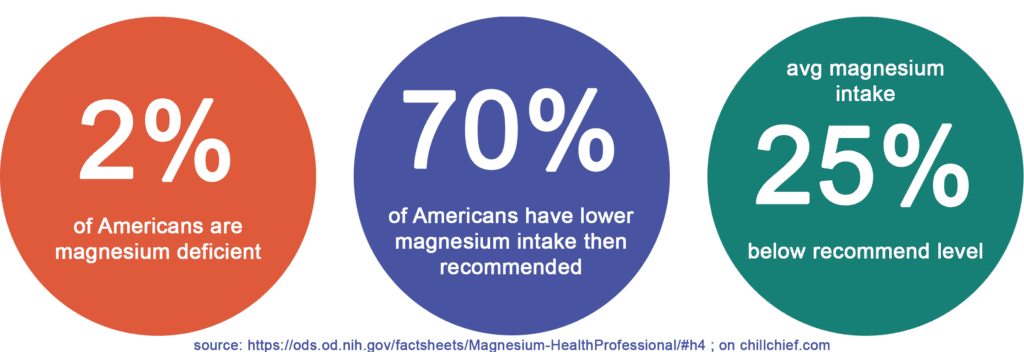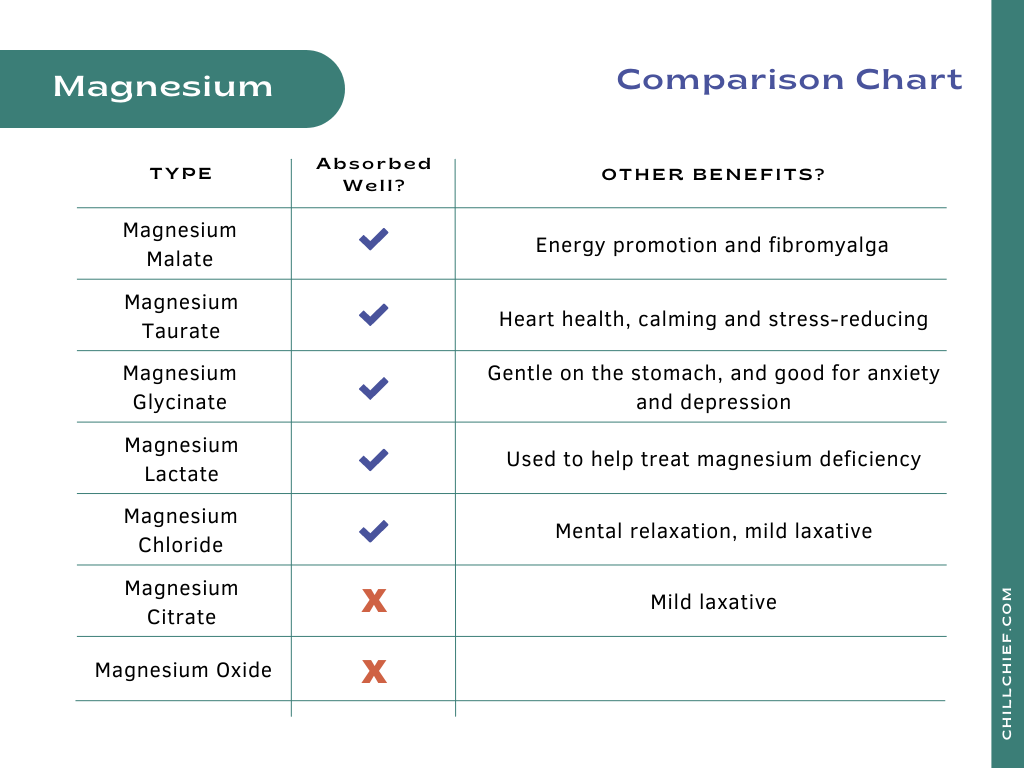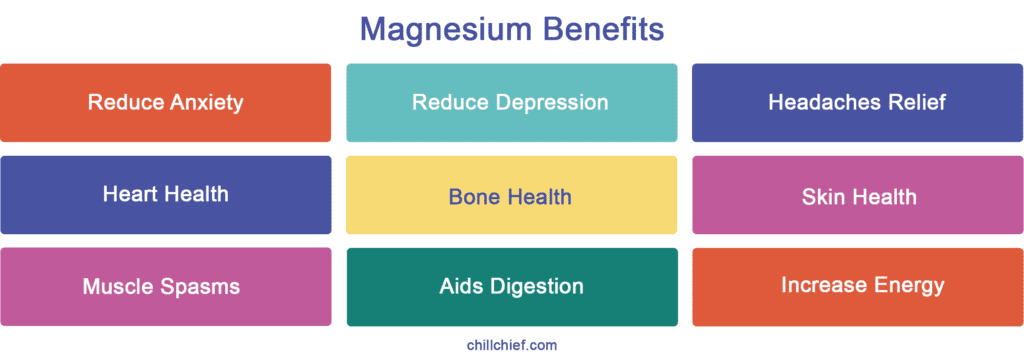
Updated: 22Jan22
Minerals help power important functions in our brain and body. And using magnesium for anxiety can potentially bring relief of symptoms.
Minerals leach out of the earth’s rocky crust into the groundwater and are sucked up by plants then eaten by animals. One of those minerals is magnesium.
Low magnesium levels are a huge problem in the modern world.
One survey shows at least half of Americans consume lower amounts of magnesium than recommended. So now we know magnesium is good for anxiety but what is the best magnesium for anxiety?
Here we cover:
- How magneisum works
- Low magnesium and magnesium deficiency
- Types of magnesium supplements
- Magnesium Comparison Chart
- Best magnesium supplements for anxiety
- Magnesium dosage
- When to take magnesium
- Magnesium food sources
- Magnesium benefits
- Magnesium sIde effects
- Magnesium supplement FAQ
*Be sure to contact your doctor before taking any supplements (including magnesium), especially if you are taking medication, pregnant, or breastfeeding.*
How does magnesium work in the body and brain?
Remember the sodium-potassium pump from school? Teachers talked about it in almost every science class.
Magnesium helps keep the sodium-potassium pump working. When it comes to the nervous system, the sodium-potassium pump helps keep your nerves functioning and messaging properly.
Magnesium also plays a role in the HPA axis, interacts with serotonin, and interacts with GABA. All of which are important in regulating anxiety.
If you are interested in other vitamins and minerals that benefit the brain and lower anxiety levels, this article has a great overview.
Low magnesium and magnesium deficiency
According to the National Institute of Health, most people in the United States do not get enough magnesium from their diets. In developed countries, low magnesium levels are more common because of refined foods.
Only around 2% of Americans have magnesium deficiency but around 70% have lower intake than recommended. A large study of magnesium intake in America had men and women falling at about 25% below the recommended level.
Low magnesium can be hard to diagnose. Not only are the symptoms general but measuring magnesium in the body is difficult.

Low Magnesium and Mental Health
More studies need to be completed to understand the exact impact of low magnesium on mental health. Serotonin is one of the main neurotransmitters when it comes to anxiety. Low magnesium in the body may reduce serotonin levels.
A promising review of 18 studies on the relationship between magnesium and anxiety suggests that magnesium may be beneficial for anxiety sufferers. Magnesium has been studied more heavily in regards to depression and has been found to work as well as other antidepressants.
Low magnesium symptoms include:
- Insomnia
- Anxiety
- Depression
- Muscle cramps
- Sleepiness
- Heart Palpitations
- Brain Fog
- Body odor
- Gut disorders
Types of Magnesium Supplements
Magnesium provides the brain and body with benefits like improving digestion, strengthening bones, reducing muscle cramps, lowering inflammation, and improving mental health.
But in order for the body to use magnesium, it needs to be able to absorb the magnesium into the bloodstream. The better it can absorb the more bioavailable it is. In order to be maximally useful for the brain magnesium also needs to be passed through the blood-brain barrier.
Here are a few of the most common forms of magnesium, their absorption rate, and potential benefits.
Chelated Magnesium: A general term used to describe magnesium bound to a negatively charged molecule which keeps it from being destroyed in the body causing high absorption in small intestines
- Magnesium Malate: Absorbed easily, energy promotion, fibromyalgia
- Magnesium Taurate: Absorbed easily, heart health, calming and stress-reducing
- Magnesium Glycinate: Absorbed easily, gentle on the stomach, and good for anxiety and depression
- Magnesium Lactate: Absorbed easily, used to help treat magnesium deficiency
- Magnesium Chloride: Absorbed easily, mental relaxation, mild laxative
- Magnesium Citrate: Poor absorption, generally used as a mild laxative
- Magnesium Oxide: Poor absorption around 4%, inexpensive form of magnesium found in most multivitamins, not a good choice for anxiety relief

Best Magnesium Supplement for Anxiety
Using magnesium for anxiety relief may be a good option to consider since a large portion of the population has low magnesium intake, which can cause anxiety symptoms.
When considering different forms of magnesium it is important to take a form of magnesium for anxiety that is easily absorbed by the body.
Best Magnesium for Anxiety: Magnesium Glycinate and Magnesium Taurate
NATURELO Magnesium Glycinate is one brand to consider. You can see customer reviews and purchase it on Amazon here.
- Capsule Count: 120
- Capsule Per Serving: 1
- Number of Servings: 120
- Milligrams per capsule: 200 mg
- Non-GMO: Yes
- Gluten-free: Yes
- Vegan: Yes
- Organic: Yes
- Good Manufacturing Processes: Yes
Price: $15 to $25
If you are interested in exploring other herbs and supplements that can help lower anxiety, this article is a good place to learn.
The product link above is an affiliate link, which means chill chief earns a small commission if you purchase at no extra charge to you.
How much and when?
Magnesium Dosage
Recommended Daily Allowance (RDA) for Magnesium from the NIH:
- Age 19+ Male: 400-420 mg
- Age 19+ Female: 310-320 mg
How much magnesium for anxiety?
Anxiety and stress cause magnesium to be eliminated from the body more quickly. The full recommended dosage by the NIH can be helpful to replenish depleted magnesium levels.
When to take magnesium
Consistency is key regardless of when a supplement is taken. Often times it is suggested to take magnesium for anxiety a few hours before bed. Be sure to follow the instructions listed on the bottle.
How long does it take for magnesium to work
This question cannot be easily answered. Effects have a lot to do with the magnesium concentration already in your system, the foods you eat, and how much magnesium you consume.
Food sources with high magnesium
- Nuts (Almonds, cashews, peanuts, etc.)
- Leafy greens (Spinach, etc.)
- Beans (Black beans, kidney beans, etc.)
- Soy Milk
- Wheat
- Avocado
Calcium and magnesium
Magnesium has been stripped out of many processed foods whereas calcium has been added. This wouldn’t be an issue except calcium may interfere with the absorption of magnesium and cause excess excretion of magnesium.
Magnesium benefits
Mental health
- Reduce Anxiety
- Reduce Depression
- Headaches Relief
Other
- Heart Health
- Bone Health
- Skin Health
- Muscle Spasms
- Aids Digestion
- Increase Energy

Magnesium side effects and overdose
It is hard to overdose on magnesium since excess magnesium is removed by the kidneys. If you do consume too much magnesium you may experience frequent trips to go pee, dizziness, fatigue, and diarrhea.
Magnesium is a safe supplement but can interact with other medications. Magnesium may be difficult to eliminate from the body if you have kidney problems or other health issues. Talking to your doctor is always a good idea before adding any supplementation.
To sum it all up…
Low magnesium levels are a rampant problem in the modern world. America has some of the worst processed foods globally further adding to low magnesium levels among the population.
Magnesium supplementation may be a good idea if you experience anxiety and depression. There is promising evidence that supports the relationship between low magnesium levels and symptoms of anxiety. Magnesium supplementation is rarely harmful and can add to your overall health.
The best forms of magnesium to consume are those that are easily absorbed by the body. Consider taking magnesium glycinate or magnesium taurate for anxiety. Magnesium malate is a great form to consider for sleep issues associated with anxiety.
If you want a convenient chart to return back to with dosage information, this vitamin and mineral dosage chart has recommended daily values for the top brain vitamins and minerals.
Cheers to another step to a healthy body and mind!
Please talk to your doctor, as always, before adding any supplement to your life.
Magnesium FAQ
Magnesium Glycinate is best for anxiety because of its ability to be absorbed by the body and due to its calming effects.
Studies have shown that magnesium can help relieve anxiety. The amount of relief depends on the individual and the type of magnesium being consumed.
Magnesium plays an important role in the nervous system and can help relieve stress and anxiety.
Yes. Symptoms of low magnesium include insomnia, anxiety, depression, muscle cramps, sleepiness, heart palpitations, brain fog
and/or body odor.
Yes, taking the recommended dosage of magnesium by the NIH is safe to consume daily.






